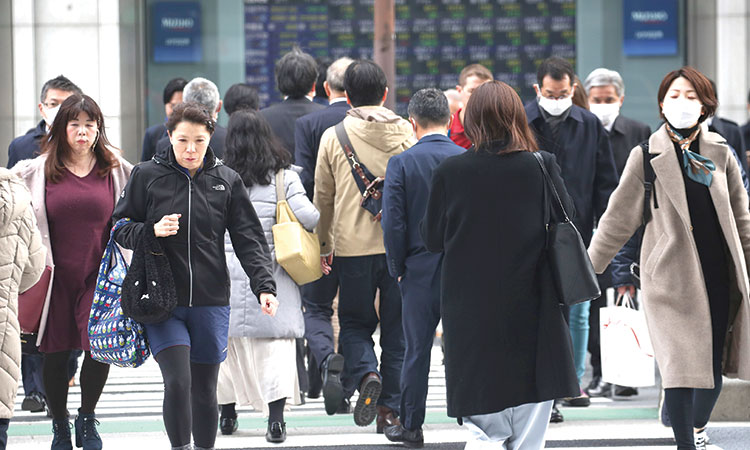Japan’s economy shrinks on weak domestic demand, exports in Q1

New cars for exports at a factory in Kawasaki, Japan. Reuters
Gross domestic product (GDP) is expected to have fallen 0.2% in January-March on an annualised basis, the poll of 18 economists showed, after it expanded 1.9% in the fourth quarter last year.
That would translate into a flat reading on a quarter-on-quarter basis, after the economy grew 0.5% in the October-December quarter, the poll showed.
“Firms likely postponed their capital spending on worries about the global economic slowdown and uncertainty over trade talks such as between the United States and China,” said Kentaro Arita, senior economist at Mizuho Research Institute.
“We expect consumer spending declined as their sentiment deteriorated led by factors such as rises in food prices.”
Capital spending likely fell 1.7% in the first quarter after 2.7% growth the previous quarter, the poll found.
Private consumption, which accounts for about 60 per cent of GDP, was seen down 0.1% for the quarter, after rising 0.4% in October-December.
External demand - or exports minus imports - was still expected to add 0.3 per centage point to growth in the first quarter, the poll found, after it subtracted 0.3 per centage point from GDP growth in the previous quarter.
Analysts say a drop in imports due to weak domestic demand was larger than a decline in exports, which led Japan’s net exports to improve for January-March.
“We project exports will grow moderately but they will lose momentum on the global economic slowdown,” said Akane Yamaguchi, researcher at Daiwa Institute of Research.
Like other Asian exporters, Japan has been hit by China’s economic slowdown and the 10-month-long US-China trade war, which has disrupted global supply chains. Sluggish demand for electronic gadgets has also hit its hi-tech exports.
On Friday, the US sharply raised tariffs on Chinese goods and China said it would retaliate, adding to uncertainty over external demand in the second half of the year.
Japan ships parts and heavy machinery to manufacturers in China. The Cabinet Office will release the GDP data on May 20. Japan’s current account balance is expected to show a 3.16 trillion yen ($28.80 billion) surplus in March from 2.68 trillion yen in February, thanks to income gains from overseas investment, analyst said.
The government will announce current account balance data at 8:50 a.m. on May 14.
Meanwhile, Japan’s Nikkei booked its largest weekly loss in over 4 months on Friday as the United States raised tariffs on Chinese goods, escalating a trade dispute that is inflicting growing damage on other export-reliant Asian economies.
The Nikkei share average closed down 0.27% at 21,344.92 points, falling for a fifth straight session.
The benchmark index lost 4.1% on the week, its worst such performance since it recoiled 5.7% in the week of Dec.21, 2018.
Yutaka Miura, a senior technical analyst at Mizuho Securities, said Japanese equities may drop further if US equities extend losses after the tariffs went into force.
“US stocks didn’t lose much during the previous session. It showed there were investors who didn’t think the tariff hike to 25% would go through,” said Miura.
Though cyclical stocks such as shipping firms fell, machinery manufacturers with high exposure to China managed to recover some of their losses this week on short-covering. Shippers Kawasaki Kisen and Mitsui OSK Lines closed down 2.3% and 1.5%, respectively.
Robot maker Fanuc Corporation gained 0.8% and Yaskawa Electric finished 2.3% higher.
Panasonic fell 6.5% after it forecast operating profit for the year through March 2020 to slump 27% to 300 billion yen ($2.7 billion) from a year earlier.
That was a bigger drop than the 12% decline expected by analysts, according to Refinitiv data.
Mitsubishi Motors tumbled 13.8% after Nomura Securities cut its target price by 23% to 560 yen, citing the yen’s appreciation against the Australian dollar and euro.
The carmaker’s strategy to focus on SUVs and pick-up trucks and markets such as Southeast Asia and Australia was right, Nomura analysts said, but they added “the company faces a slowdown in key markets as well as increased fixed costs and a strong yen.”
Subaru Corporation dropped 2.7% after it inadvertently uploaded its financial results on its website earlier than planned.
Its operating profit fell 48.5% to 195.53 billion yen ($1.78 billion) in the year ended in March, hit by a string of recalls, production stoppages and inspection cheating.
Reuters







